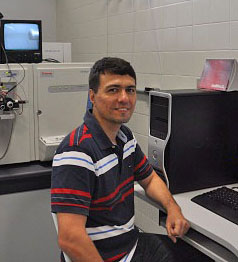Hospitals involved
Hospital Delphina Rinaldi Abdel Aziz in city of Manaus, Amazonas (Brazil).
Type of analysis
Early determination of COVID patient prognosis is fundamental for downstream medical decisions. We are looking forward in obtaining samples of patients in early stages of covid for proteomic profiling. We will then compare the profiles of this patients that died or were not so aggravated by the disease. The hallmark of our approach is that traditional proteomic pipelines rely on search engines that compare experimental spectra from those theoretically generated from a sequence database. Important PTM signatures, splicings and mutations are overlooked by such approach. We will overcome these limitations using DiagnoProt, a computational approach developed by our team that uses artificial intelligence to learn and classify MS/MS based proteomic profiles. We were originally using it to diagnose resistant bacteria but we are now looking forward in using it for Corona prognosis as well with minor adaptations. We believe we will be able to point out important signatures to aid in medical conduct.
